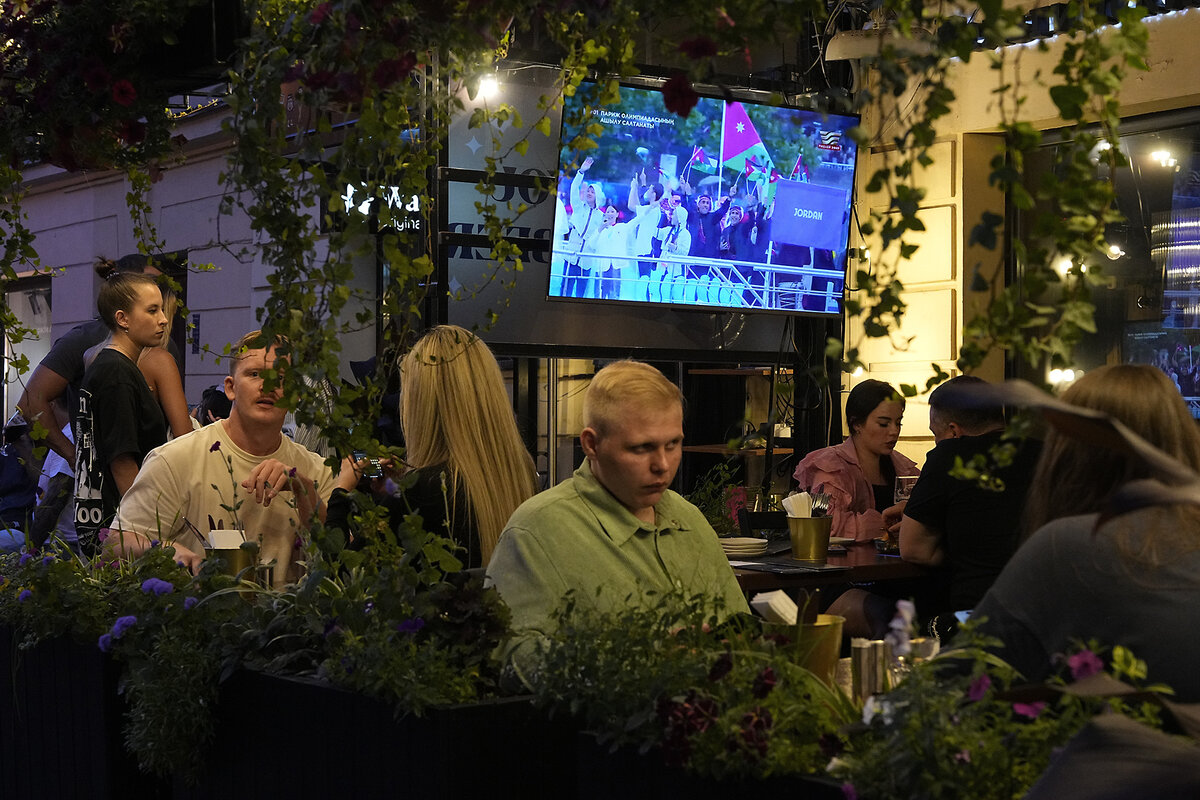Russians used to love the Olympics. This year, not so much.
Loading...
| Moscow
The colors of most of the world's nations have been on display at the Summer Olympic Games in Paris, with one notable exception: Russia. Due to its invasion of Ukraine, Russia has been officially banned, and only 15 of its athletes are allowed to compete as individuals without national identification.
The Russian public appears to be turning away from the Olympics in response.
Moscow’s official reaction to the Olympic ban of most Russian athletes has been furious denunciation. The state media are full of derisory commentary about the alleged hypocrisy, decadence, and even blasphemy that is supposedly on display in Paris. No Russian TV station is broadcasting the Games.
Why We Wrote This
Most Russian athletes are stuck outside looking in at the Paris Olympics. That has dissuaded most of the Russian public from paying the Games any heed, despite opportunities to watch.
Still, they are being closely followed in the print media, particularly the mass-circulation daily Sport-Express. And live coverage of the Games is available with Russian-language narration on the official Olympic website, and the Russian government seems to be making no attempt to block it.
Yet barely 4% of respondents in an ongoing Sport-Express poll said they were watching the Olympics online, and only a further 10% said they were following it in the media. A whopping 60% indicated that they were not interested in the Games at all. In the comments section on the site, many remarked on the lack of Russian participation as a key reason for ignoring these Games.
“There are two trends in public opinion about this,” says Oleg Shamoneyev, an editor at Sport-Express. “Some think the 15 Russian athletes who went there to take part as ‘neutrals’ are traitors, and we should show no interest in any part of this show.
“But there are others who believe sports should be separate from politics. Whatever we may think about the International Olympic Committee excluding Russia, we should still take an interest in the performance of Russian athletes, even without national symbols, because these Games are an important global sporting event and one day we will return to them.”
The overwhelming disinterest in the current Games is a far cry from just 10 years ago, when Russia hosted the Winter Olympics in Sochi with much fanfare and an outpouring of public enthusiasm. But a series of doping scandals involving Russian athletes in the years that followed put serious political strains on Russia’s Olympic involvement, even though Russians continued to show effusive interest whenever their teams were allowed to participate.
With the near-total exclusion from Olympic involvement that took hold after Russia’s 2022 invasion of Ukraine, the Russian government has begun sponsoring alternative athletic events to keep Russian athletes active and the public engaged. The Russian city of Kazan hosted the BRICS Games in June, featuring athletes mostly from countries of the Global South. That lavishly funded competition got a lot of play on Russian TV.
September will see the World Friendship Games in Moscow and Yekaterinburg, which organizers claim will involve over 5,000 athletes from dozens of countries competing in many quasi-Olympic sports for cash prizes as well as medals. Critics say these alternative Games are unlikely to attract much top-tier athletic talent, and probably won’t make any lasting impression on global sports.
But a March poll conducted by the state-funded VTsIOM agency found that two-thirds of Russians thought the upcoming Moscow games were a significant event for the country. Thirty-eight percent mentioned the importance of creating an alternative to the Olympic movement, while 34% said it was necessary for Russia to continue developing international cooperation in sports.
That suggests that Russia’s alienation from the mainstream of international sports may be taking on a permanent character.
“I think the Paris Olympics have nothing to do with genuine international sports,” says Alexander Sharygin, a former sports adviser to the right-wing Liberal Democratic Party in Russia. “By depriving Russian athletes of the chance to take part, someone may have hoped that angry Russian fans would turn against the Russian leadership. But what people really think is, well, if that’s the way it is, then who needs your Olympics?”
Editor's note: The original version misspelled Mr. Sharygin's last name.







